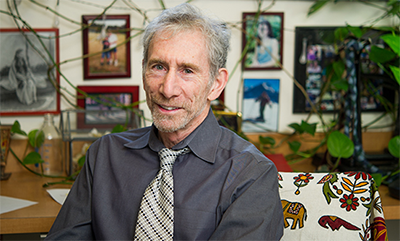Faculty Bios.
David H. Sherr, PhD
Since 1993, David Sherr’s laboratory has conducted research on how common environmental pollutants, such as dioxins, polycyclic aromatic hydrocarbons and PCBs, adversely affect the growth and behavior of several different types of normal and malignant cells. In previous work, the Sherr laboratory studied how environmental chemicals affect the development of the immune system. In specific, his laboratory demonstrated that aromatic hydrocarbons (generated by the combustion of any carbon source) compromise the function of bone marrow cells required for the development of antibody-forming cells. These cells are critical for immune protection against viruses and bacteria. This work had its origins in Dr. Sherr’s graduate studies on the ontogeny of lymphocyte development.
More recently, Dr. Sherr’s laboratory has focused on the molecular mechanisms that initiate and maintain breast cancer, and on the effects of environmental chemicals on these processes. A major goal of these studies is to accumulate data supporting the need for cancer prevention by limiting exposure to environmental carcinogens. The laboratory has shown that a cellular protein receptor, referred to as the aryl hydrocarbon receptor (AHR), plays an important role in the initiation and progression of human breast cancer. The results explain, in part, the association between environmental chemical exposure and breast cancer risk. Perhaps most importantly, these studies demonstrate that the AHR drives human breast cancer cells to invade and, presumably, metastasize even in the absence of environmental chemicals. These observations have led to the development of AHR inhibitors that block AHR activity and prevent tumor cells from invading. One immediate goal of the laboratory, therefore, is the development of potent AHR inhibitors as novel, targeted therapeutics to be used for treatment of all breast cancers but especially for treatment of “triple negative” or chemotherapy-resistant breast cancers. Interestingly, preliminary studies suggest that these AHR inhibitors could be useful for treatment of several other cancer cell types.
A new area of study in Dr. Sherr’s laboratory is the analysis of the role of the AHR in blood cell development. These studies are important from both an environmental science and medical science point of view. Studies performed to date suggest that the AHR plays an important role in the normal development of blood cells. The results posit the intriguing possibility that common environmental pollutants can alter normal blood cell development by interfering with AHR signaling.
A third area of work in the Sherr lab is the identification of genomic profiles that can quickly determine if any given chemical is likely to carcinogenic or not. This is a particularly important endeavor since only ~2.5% of the 84,000 chemicals registered by the EPA has been evaluated for carcinogenicity.
Dr. Sherr came to BUSPH from the faculty of Harvard Medical School, where he had earlier been a postdoctoral fellow in the department of Nobel Laureate Baruj Benacerraf. The Sherr Laboratory is funded by research grants from the National Institute of Environmental Health Sciences, the NIH Superfund Basic Research Program, and the Art BeCAUSE Breast Cancer Foundation. Dr. Sherr is the Director of the Boston University Superfund Research Program and a member of the BU Cancer Center, the Immunology Training Program, and the Hematology/Oncology Training Program. He has trained 24 postdoctoral (M.D. or Ph.D.) and 12 predoctoral (M.D. and/or Ph.D.) fellows and has won the BU School of Public Health Excellence in Teaching Award 3 times. Dr. Sherr’s complete resume can be found here.
